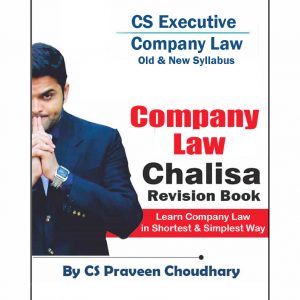CS Executive Jurisprudence Important Topics. In the previous post, we have given tips on How to Prepare CS Executive New Syllabus Tax Laws. Today we are providing important Topics and Questions which should be prepare very well for CS Executive New Syllabus Tax Laws Paper.Scroll Down
Best CS Executive New Syllabus Video Lectures
Note: As June 2020 is 4th Attempt of CS Exams New Syllabus, We are providing you a Broader List of Important Topics so that you do not miss out on anything. Also this List is made keeping into view ICSI Study Material.
| CS Executive Jurisprudence Important Topics : Sources of Law |
- Sociological Definition of Law
- Realist Definition of Law
- Principle Sources of Indian Law
- Classification of Customs
- Requisites of a Valid Custom
- Kinds of Precedents
- Ratio Decidendi
- Obiter Dicta
- Doctrine of Stare Decisis
- personal law of Mohammedans
- Secondary Source of Indian Law
- Justice, Equity and Good Conscience
- Chief sources of English law
- Sources of Mercantile Law
- Jurisprudence
- John Austin’s Command Theory of Law
- Roscoe Pound’s theory of law
- Salmond’s theory of law
- ‘Pure Theory of Law’
- Bentham’s eight respects of law
- Distinguish between Declaratory Precedents and Original Precedents
|
| CS Executive Jurisprudence Important Topics : Constitution of India |
- Peculiar Features Of Indian Federalism
- Doctrine Of Severability
- Doctrine Of Eclipse
- Waiver
- Article 14
- Article 14
- Article 17
- Rights Relating To Freedom
- Monopoly
- Preventive Detention
- Articles 31a, 31b And 31c Relating To Property
- Directive Principles Of State Policy
- Conflict Between A Fundamental Right And A Directive Principle
- Fundamental Duties
- Ordinance Making Powers Of President
- Freedom Of Trade, Commerce And Intercourse
- Types Of Writs
- Delegated Legislation
- Classification Of Subordinate Legislation
- Law Making Process (How A Bill Becomes An Act)
- Ad Hoc And Standing Committees
- Does A Law Made By A State To Create Monopoly Rights In Favour Of A Person To Carry On Any Business Affect The Freedom Of Trade?
- The Constitution Of India Is “Federal In Character But With Unitary Features”.
|
| CS Executive Jurisprudence Important Topics : Interpretation of Statutes |
- Need For and Object of Interpretation
- The Primary Rules of Interpretation
- Expressio Unis Est Exclusio Alterius
- Contemporanea Expositio Est Optima Et Fortissima in Lege
- Noscitur a Sociis
- Internal Aids in Interpretation
- External Aids in Interpretation
|
Best CS Executive New Syllabus Video Lectures Combos
| CS Executive Jurisprudence Important Topics : General Clauses Act, 1897 |
- General Rule of Construction
- Kinds of Rule of Construction and Interpretation
- Powers and Functionaries
- “Rule of Construction is a rule used for interpreting legal instruments, especially contracts and statutes”.Comment
|
| CS Executive Jurisprudence Important Topics : Administrative Laws |
- Need for Administrative Law
- Principal sources of administrative law in India
- Judicial Control over Administrative Actions
- Principles of Natural Justice
- Exceptions to Natural Justice
- Effect of Failure of Natural Justice
- Effect of a valid contract with Government
- Quasi-Contractual Liability
- Liability of the Public Servant
- main features of Statutory Corporations
- The liability of the government can either be contractual or tortious. Discuss.
- The liability of the State is vicarious for the wrongful acts of its servants. Comment.
|
| CS Executive Jurisprudence Important Topics : Law of Torts |
- General Conditions of Liability For A Tort
- Difference Between Damnum Sine Injuria And Injuria Sine Damnum
- Mens Rea
- Kinds Of Tortious Liability
- Exceptions to The Rule Of Strict Liability
- Vicarious Liability
- Torts or Wrongs To Personal Safety And Freedom
- Extra Judicial Remedies
|
Best CS Executive New Syllabus Video Lectures Combos
| CS Executive Jurisprudence Important Topics : Limitation Act, 1963 |
- Bar of Limitation
- Doctrine of sufficient cause
- Persons under legal disability
- Continuous Running of Time
- Effect of Acknowledgement on the Period Of Limitation
- Effect of Payment On Account Of Debt or Of Interest on Legacy
- Classification of Period of Limitation
- Sufficient causes for extension of time period under limitation act, 1963?
- Acquisition of Ownership by Possession
- “Period of Limitation once starts cannot be stopped” Comment.
|
| CS Executive Jurisprudence Important Topics : Civil Procedure Code, 1908 |
- Essentials of A Decree
- Meaning of Judgement-Debtor
- Limitation on Jurisdiction of A Civil Court
- Doctrine of Res Sub Judice And Its Essential Conditions
- Place of Suing
- Res Judicata And Its Conditions
- Set-Off Counter-Claim And Equitable Set-Off
- Interlocutory Orders
- Main Essentials of The Suit
- Misjoinder of Parties
- Delivery of Summons By Court
- Summary Procedure
- Suits By or Against Minors
- Reference, Review and Revision
- Kinds of appeals
- Affidavit
- Judgement
- Decree
- Defendant has four remedies available if an ex-parte decree is passed against him. Explain.
|
| CS Executive Jurisprudence Important Topics : Indian Penal Code, 1860 |
- Exemption from intra-territorial jurisdiction of IPC
- Fundamental Elements of Crime
- Stages of Crime
- Punishment
- Definition of criminal conspiracy
- Dishonest misappropriation of property
- Criminal breach of trust – essential ingredients
- Criminal breach of trust by public servant, or by banker, merchant or agent
- Cheating and its main ingredients
- Forgery
- Defamation
- Kinds of Defamation
- Printing or engraving matter known to be defamatory
- General exceptions
- State the cases in which mens rea is not required in criminal law.
|
Best CS Executive New Syllabus Video Lectures Combos
| CS Executive Jurisprudence Important Topics : Criminal Procedure Code, 1973 |
- Complaint and its requisites
- Classes of Criminal Courts
- Power of the Court to pass sentences
- Arrest of Persons
- Summons and Warrants
- Search Warrant
- Power to issue order in urgent cases of nuisance or apprehended danger
- Information to The Police And Their Powers To Investigate
- Powers of Magistrate
- Summary Trials
- Distinguish between (a) Cognizable and Non-cognizable offences (b) Inquiry, Investigation and Trial (c) Bailable and Non-bailable offences (d) F.I.R. and Complaint.
- Is the Code of Criminal Procedure a substantive or an adjective law, or both?
- Discuss the procedure for search and seizure: (i) of persons (ii) of things.
|
| CS Executive Jurisprudence Important Topics : Indian Evidence Act, 1872 |
- Meaning of Evidence
- Logical relevancy and legal relevancy
- Hearsay rule
- Confessions Vs. Admissions
- Opinion of Third Persons When Relevant
- Cases in which opinion of expert is relevant.
- Priviliged Communications
- Oral, Documentary And Circumstantial Evidence
- Estoppel
- Kinds of Estoppel
|
| CS Executive Jurisprudence Important Topics : Special Courts, Tribunals under Companies Act & Other Legislations |
- Orders of Tribunal
- Appeal from Orders Of Tribunal
- Procedure before Tribunal And Appellate Tribunal
- Special Courts
- Discuss the power of NCLT under Companies Act, 2013 regarding Winding Up of the Company
- Procedure of appeal before the National Company Law Tribunal
- Offenses triable by Special Courts
- Difference between a Court and a Tribunal
|
Best CS Executive New Syllabus Video Lectures Combos
| CS Executive Jurisprudence Important Topics : Arbitration and Conciliation Act, 1996 |
- Arbitral Award
- International Commercial Arbitration
- Arbitration Agreement
- Number of arbitrators
- Appointment of Arbitrators
- Failure or impossibility to act as an arbitrator
- Termination of Mandate and Substitution of Arbitrator
- Place of arbitration
- Time limit for arbitral award
- Fast track procedure
- Form and contents of arbitral award
- Correction and interpretation of award; additional award
- Enforcement
- Conditions for enforcement of foreign awards
- Number of conciliators
- Appointment of conciliators
- Role of conciliator
- Termination of conciliation proceedings
- Alternative Dispute Resolution
- Grounds to challenge the appointment of an Arbitrator
- Part I of the Arbitration and Conciliation Act, 1996 applicable only to all the arbitrations which take place within the territory of India. Comment
|
| CS Executive Jurisprudence Important Topics : Indian Stamp Act, 1899 |
- Bill of Lading
- Instrument
- Bill of exchange
- Bond
- Lease
- Promissory Note
- Settlement
- Instruments Chargeable With Duty
- Securities Dealt In Depository Not Liable To Stamp Duty
- Consideration to Be Set Out
- Apportionment
- Party Liable to Pay
- Methods of Stamping
- Cancellation of Adhesive Stamps and Its Modes
- Writing on Stamp Paper
- Denoting Duty
- Impounding
- Admission of Improperly Stamped Instruments
- Can Parliament increase or, decrease, the stamp duty on an agreement?
- A document creates a lease of property X and also grants a gift of property Y. How is the stamp duty to be calculated, on this document?
- Is an agreement for the sale of goods “conveyance”, for the purposes of the Stamp Act? Discuss
|
| CS Executive Jurisprudence Important Topics : Registration Act, 1908: Registration of Documents |
- Documents Whose Registration Is Compulsory
- Documents Of Which Registration Is Optional
- Time Limit For Presentation
- Documents Executed Out Of India
- Presentation Of A Will
- Place Of Registration
- Presenting Of Documents For Registration
- Registered Document When Operative
- Effect Of Non-Registration Of Documents Required To Be Registered
- Refusal To Register By The Sub-Registrar
- Appeal To Registrar
- Exemption Of Certain Documents Executed By Or In Favour Of Government
- Object Of The Law Of Registration
|
Best CS Executive New Syllabus Video Lectures Combos
| CS Executive Jurisprudence Important Topics : Right to Information Act, 2005 |
- Objective Of RTI Act
- Obligations Of Public Authority
- Designation Of Public Information Officers (PIO)
- Duties Of A PIO
- Exemption From Disclosure
- Partial Disclosure Allowed
- Who Is Excluded?
- Information Commissions And Their Powers
- The Rti Act Confers On All Citizens A Right To Information. Enumerate The Salient Features Of The Act.
|
| CS Executive Jurisprudence Important Topics : Information Technology Act, 2000 |
- Documents Or Transactions To Which The Act Shall Not Apply
- Definition of Key pair “computer network”, “electronic form
- Digital Signatureand Electronic Signature
- Validity Of Contracts Formed Through Electronic Means
- Attribution And Dispatch Of Electronic Records
- Certifying Authorities
- Compensation For Failure To Protect Data
- Electronic Signature Certificates
- Liability Of Network Service Providers
- State, in brief, about the Appellate Tribunal, under the Information Technology Act, 2000
- What are the offences provided in the Information Technology Act, 2000, for various kinds of misuse of computer?
|
Best CS Executive New Syllabus Video Lectures Combos
CS Executive Jurisprudence Important Topics :
This paper consists of three components, namely Jurisprudence, Interpretation and General Laws (JIGL).
Fundamental objective of this subject is to enable the students to understand and acquire working knowledge of Jurisprudence, Interpretation and General Laws. After studying this material the student will be able to analyse principles underlying the legal postulates and propositions, and connection between theory of law and practice.
As a Company Secretary, one is expected to know how to interpret and be well versed with the basic concepts of law.
CS Executive Jurisprudence Important Topics : Important Topics of CS Executive New Syllabus Exam
Here we are providing subject wise important topics to CS Executive students. See below How to prepare CS Executive Module – 1 and Module – 2. Click below links










